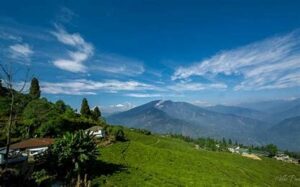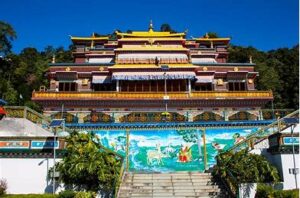Remember, because nothing is ended but it is changed.
-Mamang Dai(Legends of Pensam).
Dai was born in Pasighat, Arunachal on 29 February 1957 to a renowned family sharing the rich heritage of the Adi tribe in Arunachal. But Dai’s life hasn’t been one of convention, nor fitted to the life permitted by her tribe. Defying expectations and through immense dedication, Mamang Dai became the first woman from her society to join the coveted Indian Administrative Service.
However, the pull of storytelling was too close to her heart. Leaving the world of bureaucracy behind, she embraced journalism. Later, she excelled in her career becoming the correspondent for The Telegraph, Hindustan Times, and The Sentinel.
A true daughter of the Northeast, Dai is not just a journalist; she’s a chronicler, a poet, a bridge between the mainstream world and the world of her.
Dai’s celebrated work
Dai never failed to understand the voice she had earned from her position and reputation. She wasn’t content with merely reporting the news. She grew to become a postcolonial thinker. After working in the mainstream, Dai yearned to delve deeper. She wanted to unearth the hidden narratives of her people, their land, and their history.
One of the peculiar things about Arunachal is their folklore and storytelling. For generations, they have narrated their history and present with word of mouth. Being a daughter of that very land, she had it in her veins to do the same. Her poems, published in collections like “River Poems,” painted vivid pictures of life in the Himalayas. They capture Arunachal’s raw beauty and quiet resilience.
Mamang Dai’s journalistic work also explored the unaddressed complexities and plight of her state. She addressed issues like tribal identity, environmental conservation, and the changing landscapes of the Northeast. Her articles, often laced with personal anecdotes and historical context, gave a voice to the voiceless, challenging stereotypes and injustices.
Her impactful writings, including poems, are featured in various journals and anthologies. Notable among her other works are ‘The Legends of Pensam,’ ‘Stupid Cupid,’ and ‘El balsam del tiempo – The balm of time.’
Awards
In 2003, Dai was honored with the state’s Verrier Elwin Award for her book “Arunachal Pradesh – The Hidden Land.”
Her literary journey reached new heights with the Sahitya Akademi Award-winning novel “The Black Hill” in 2017, where she delved into colonialism, cultural resistance, and the quest for identity against Arunachal’s historical backdrop.
Recognizing her significant contributions to literature and education, Dai was bestowed with the Padma Shri in 2011.
Activist
Aside from her work, Mamang Dai is a passionate advocate for her neighborhood. She was the President of the Arunachal Pradesh Union of Working Journalists, where she advocated for journalists’ rights. She also promoted responsible journalism throughout the province. She also indulged herself in various environmental initiatives. Her words held more power because she wasn’t just one to write about it. She implies it in her life as well.
Mamang Dai is a living example of the power of words. Her writings are more than just stories; they are glimpses into a world rarely seen and voices long silenced. She has carved herself a distinct niche in the Indian literary landscape. Her devotion to her craft and undying affection for her homeland spoke for itself. She is not only a journalist, but also a storyteller, cultural ambassador, and a voice for the Northeast.
Environmentalist
Being a child of the mountains, Mamang Dai deplores the agony of causing harm to the environment at the cost of development. She reminisces about a time when nature was celebrated and respected. The world is shifting towards anthropocentrism and it upsets her how nature is only seen as an end to gain profit. In her poem ‘This Summer,’ she writes-
“…begging the forgiveness of butterflies and beauty that we destroyed in our hunt for life.”
Mamang Dai, a nature poet, depicts the life of her nation, its traditions and culture, and her land’s legacy in her collection of poetry named River Poetry. She explains how the life of a river is always in momentum. That is how nature is, it keeps on moving. She contrasts it with human life where the end is inevitable.
As a tribe representative, she highlights the repercussions of individuals in contemporary modernity. Mamang Dai uses personification to communicate her sentiments and emotions. She adds that due to modernization, the ancient faith, traditions, culture, and identity appear to be slowly eroding. According to her, nature has no end; nevertheless, due to technological advancement and urbanization, man has forgotten this truth.
Dai’s poem “Sky Song” discusses the current plight of the environment. She also collaborated with the World Wide Fund for Environment on the Eastern Himalaya Biodiversity Hotspots program.
Conclusion
In honoring Mamang Dai, one must remember her as more than just a journalist. She is a poet, a warrior, and a profound storyteller who captures the soul of Arunachal Pradesh in the pages of our global narrative.
Dai’s award-winning literary works elevate her from the status of mere chronicler to that of custodian of her homeland’s history and culture. She expressed her words in English so that she could take her homeland’s message to the masses. Her poetry’s lyricism and narrative strength merge to form a cohesion that brings out originality to the mainstream.
Dai’s popularity goes far beyond appreciation. It is a testament to her dedication to conserving Arunachal’s rich heritage and promoting a better understanding of its complexity. Her legacy is more than just a literary mark.
Unraveling a billion untold stories, one chapter at a time, Humans of Northeast takes you on a discovery through vibrant Northeast India – a land rich in people, places, and culture. Ready to immerse yourself in more such stories?
Visit our page HONEI to read more about narratives that inspire and uplift.




